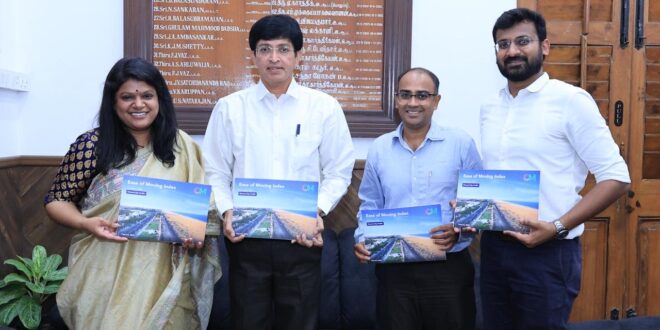CHENNAI, February 27, 2024 – The OMI Foundation unveiled the ‘Ease of Moving Index – Chennai City Profile,’ a pivotal analysis showcasing Chennai’s strides towards a sustainable and inclusive mobility ecosystem, today. The first-of-its-kind report was launched at the conference, ‘Ease of Moving in Chennai – A Sustainable Mobility Dialogue’, organised by OMI Foundation in strategic partnership with IIT Madras. The conference was graced by sustainable mobility stakeholders – city authorities, industry, citizens, and media, reflecting on the city’s resilience after the pandemic, and recent floods and climate challenges.
Key Highlights:
➢ Public Transport Utilisation: Over 95% of the respondents leverage Chennai’s efficient public transport regularly, underscoring its pivotal role in the city’s mobility landscape.
➢ Public Transport Coverage: Chennai shines with the 2nd highest percentage of respondents within 10 minutes of public transit by walk or cycle.
➢ Gender Inclusive Mobility: Stands as a model for gender inclusivity, ranking 3rd, among Mega Cities, in percentage of women and trans/non-binary using public transport.
➢ Unified Metropolitan Transport Authority: One of the only 14 cities nationally to integrate its transport operations under a unified metropolitan transport authority, streamlining mobility management.
➢ Benchmarking Mobility: Positioned 15th on the Ease of Moving Index, the city profile empowers stakeholders with data-driven insights for mobility enhancements.
The Ease of Moving Index is an evidence-based framework developed by OMI Foundation to measure and benchmark mobility in cities. It evaluates mobility across 9 parameters, 41 indicators, and 110 metrics in 40 Indian cities of varying sizes and characteristics. In the 2022 edition of the exercise, OMI surveyed over 50,000+ respondents, stratified by gender, disability, and household income, in India’s largest mobility survey, thus holistically capturing citizens’ mobility patterns, needs, aspirations, and perceptions of mobility infrastructure and services. The main report can be found here.
In Chennai, the OMI Foundation conducted the Ease of Moving Index survey with over 3,100+ respondents, including 43% women, 2% trans/non-binary, 4.3% persons with disabilities, with 57% owning their homes. Additionally, 3% were caregivers, 7% casual or contract workers, 8% gig-platform workers, 9% self-employed or own account workers, among other demographics. The findings from the comprehensive survey provide invaluable insights on mobility in Chennai, offering opportunities for policy and on-ground action.
Central to Chennai’s urban fabric is its extensive and reliable transit infrastructure. Despite variations in bus fleet size and usage, the city’s mass transit density stands at an impressive 3.3 km per lakh population, leading the Mega Cities cluster. This infrastructure supports a notable mode share of 51%, indicating the system’s capacity to address the city’s varied mobility demands.
Chennai distinguishes itself with a remarkable 75% mode share in active (walking and cycling) and shared mobility (public/mass transport and taxis). This highlights the critical need to prioritise these modes to address concerns of unfettered motorisation and resulting traffic snarls. Motor vehicle registrations in Chennai grew at 6.6% CAGR over the last decade outpacing the population growth of 2.82% CAGR. With 575 two-wheelers and 118 cars per thousand population, Chennai’s vehicle density significantly exceeds the average of its peers, underscoring the urgency for a sustainable shift in urban mobility patterns.
Chennai’s diverse mobility offerings serve its residents well, yet there’s room for enhancing integration and connectivity. Among regular users of public transport, 57.5% utilise intermediate modes (taxis, autos, shared autos etc.), and only 2% use personal vehicles to cover the first- and last-mile. To boost these figures, strategic policy shifts are needed, including the promotion of clean and shared mobility, improved parking solutions for personal vehicles, and establishing dedicated zones for the pick-up and drop-off of shared transport users. Remarkably, 42% of residents believe that the introduction of public bicycle sharing schemes would motivate them to cycle for shorter distances.
Chennai’s efforts to lower road accidents and fatalities are progressive. However, challenges persist. Enhancing road safety, especially for vulnerable groups such as pedestrians, cyclists and two-wheeler users, remains crucial. A significant concern is inadequate lighting, highlighting an area in urgent need of attention: Less than 20% of respondents find footpaths to be properly illuminated; less than 30% find roads to be well-lit.
Chennai is exemplary in fostering inclusive mobility, leading the Mega Cities cluster with 90.6% of women and trans/non-binary respondents regularly utilising public transport. This notable achievement is due to Tamil Nadu’s initiative offering fare-free travel to women and vulnerable groups, among other factors. To build upon this success, Chennai must further enhance safety, accessibility, reliability, and affordability of its public transport system to benefit all users, by particularly focusing on women, trans/non-binary individuals, and persons with disabilities.
Despite its vast diversity and scale, Chennai is at the forefront of adopting future mobility solutions characterised by sustainability and digital innovation. 98% of all respondents had smartphones. Of them, an impressive 88% use at least one app for booking taxi rides, and a whopping 100% have applications for food or package delivery. The next strategic move for Chennai involves promoting the use of cashless payments for various mobility services, and harnessing the full potential of data and technology.
The allocation of financial resources is critical for the development and upkeep of a mobility system that is sustainable, seamless, efficient, and inclusive. It’s noteworthy that the Greater Chennai Corporation (GCC)’s budget for 2022-23 saw a substantial increase of over 14%, amounting to INR 757.28 crores more than the revised budget of the previous fiscal year. Chennai’s approach to enhancing this investment will be pivotal in charting its course towards sustainability.
The establishment of the Chennai Unified Metropolitan Transport Authority, championed by the esteemed Chief Minister, highlights the importance of a unified approach to mobility governance. The ongoing development of a Comprehensive Mobility Plan is set to significantly influence Chennai’s evolution, providing a strategic framework for a sustainable and progressive urban future.
On the occasion of the launch, Dr. J Radhakrishnan Commissioner, Greater Chennai Corporation, said, “I extend my unequivocal compliments and gratitude to the entire team at OMI Foundation for building and developing the Chennai City Profile. I am certain that as we delve into the insights provided by the City Profile, it will lead to data-driven decision making that can enable our city towards a future where mobility is seamless, accessible to all and serves as a catalyst for inclusive growth. One of the hallmarks of Chennai’s forward-thinking approach is its early adoption of a non-motorised transport policy. Initiatives such as investing in enhanced footpaths and cycling infrastructure underscore GCC’s dedication to promoting active mobility. Together, let us continue to shape Chennai into a model of urban excellence.”
OMI Foundation’s Executive Director, Ms. Aishwarya Raman said, “The OMI Foundation commends Chennai for its outstanding performance in the Ease of Moving Index India 2022, emphasising the city’s dedication to creating a robust and inclusive mobility landscape. The ‘Ease of Moving Index – Chennai City Profile’ will act as a strategic tool that empowers the city and its citizens to navigate the path towards sustainable mobility. It exemplifies the importance of data-driven strategies in fostering urban environments that prioritise sustainability and inclusivity.”
The Chennai City Profile highlights the city’s mobility achievements and also serves as a blueprint for further advancements in urban mobility, reaffirming Chennai as a beacon of progress in the realm of sustainable mobility.
 Expressnews
Expressnews







